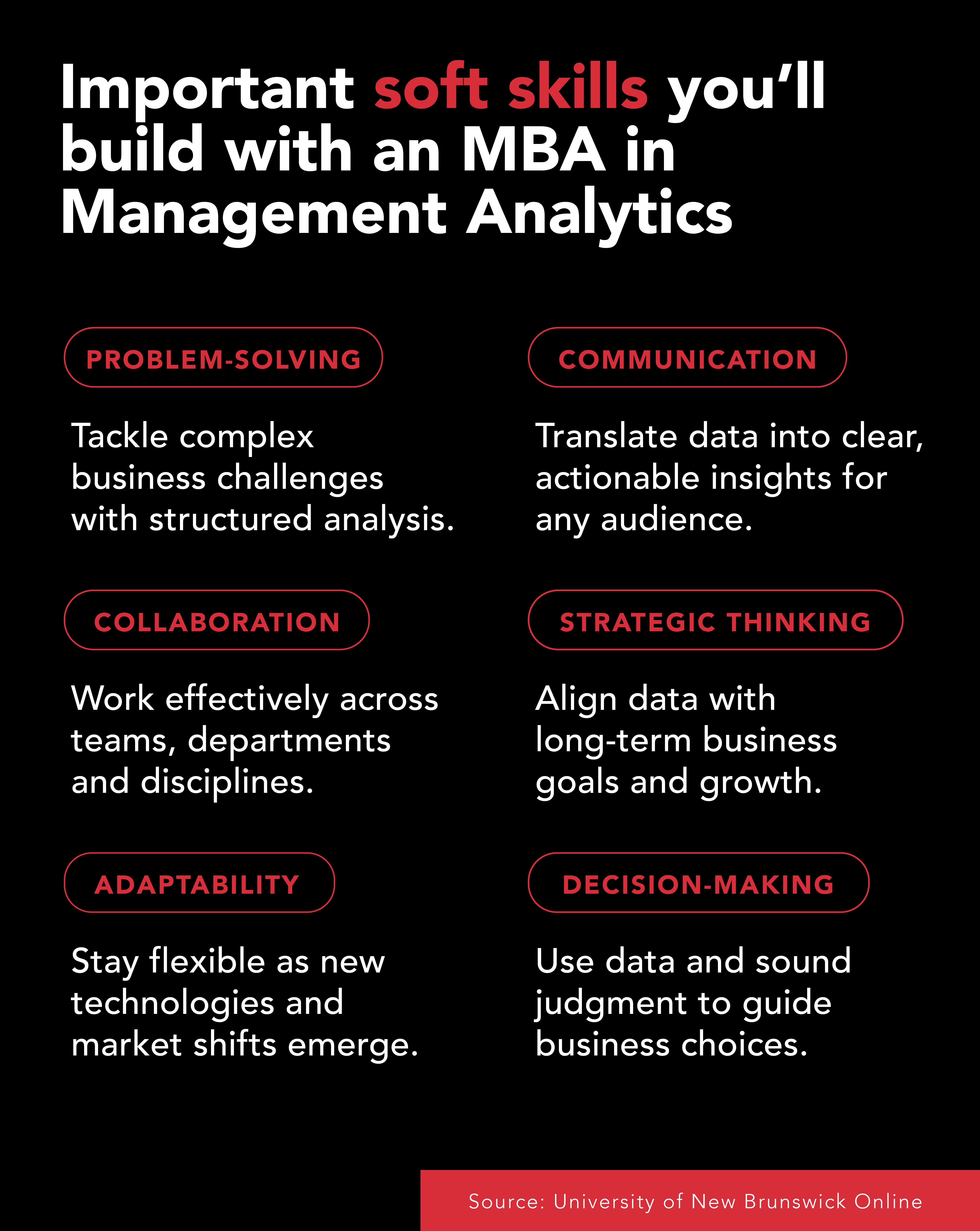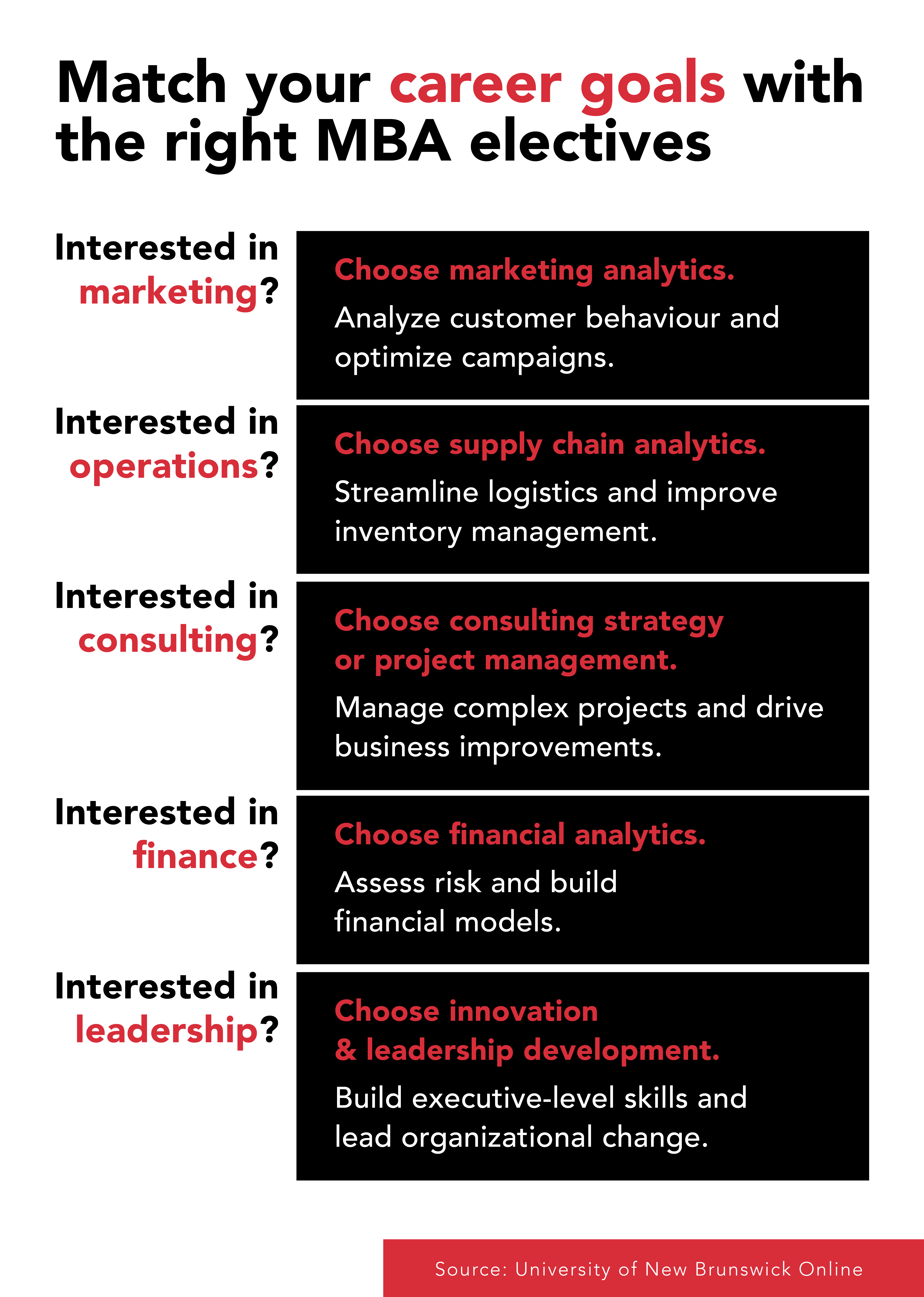If you’re considering an MBA, you’re not just moving toward a valuable credential. You're also moving toward the skills to lead, solve complex problems and drive impact across your desired industry.
Choosing an MBA with a management analytics specialization can further elevate your potential. It merges two powerful skill sets: data literacy and strategic business thinking.
This isn’t just about learning how to read charts or build models. A management analytics MBA equips you to become the person in the room who understands the numbers and the narrative.
You'll learn how to gather insights from data, interpret what they mean for business performance and guide long-term decision-making.
How a management analytics MBA bridges data and business strategy
Business & Industry Canada reports that companies using data analytics for market research are 23% more successful at acquiring new customers and 18% more successful at retaining them, highlighting how data-driven insights can directly support business growth.
However, despite this knowledge, many organizations struggle to translate data into action. They may have the dashboards, the tools and the teams, but they lack leaders who can connect those insights to bigger-picture goals.
This is where graduates with an analytics background step in.
In an MBA management analytics program, you’ll learn how data supports decision-making at the executive level. It’s not just about crunching numbers. It’s about identifying patterns, anticipating future trends and offering evidence-based marketing strategies.
You’ll also gain a rare skill: fluency across departments. You’ll learn to communicate with technical experts, like data scientists, as well as senior leadership teams. Being able to translate a predictive model into a clear business case is what turns analysis into strategy.
By bridging the gap between technical findings and business outcomes, you’ll be positioned to guide operations, financial planning and growth.

Core topics you’ll cover in a management analytics program
Data analytics, big data and predictive modelling
You’ll start with foundational concepts that define modern business intelligence. Learn to manage data warehouses, build interactive dashboards and work with widely used analytics tools.
From there, you’ll move into more advanced topics like forecasting, regression models and data mining. These aren’t abstract exercises; they’re applied to real-world business scenarios.
You’ll also learn to handle both structured and unstructured data. That means going beyond spreadsheets and working with everything from social media sentiment to customer feedback.
Machine learning and artificial intelligence
A report by Microsoft and Accenture projects that generative AI could boost Canada’s productivity by $180 billion annually by 2030. As AI continues to change, grow and integrate into more and more businesses, this part of the management analytics MBA program has become even more essential.
You’ll explore supervised and unsupervised learning, understanding how algorithms can detect patterns or make predictions.
Want to understand customer behaviour? Improve the way you analyze data? Reduce operational waste? AI can help do all of that, but only if someone understands how to apply it wisely. That someone could be you.
You’ll also examine automation in business contexts. From chatbots to supply chain optimization and inventory management, you’ll see how machine learning is already being used to improve decision-making.
Financial analytics
One of the most practical aspects of management analytics is learning how to apply data in financial contexts.
You’ll examine budgeting, financial assistance, performance forecasting and investment decisions through a data-first lens.
This portion of the program also covers financial risk analysis and return on investment. You’ll gain experience linking cost structures and performance metrics, helping you support analytical solutions that directly affect the bottom line.
Data visualization and storytelling
Gartner predicts that by the end of 2025, data storytelling will be a required skill in 75% of analytics roles, yet many professionals still struggle to craft narratives that drive change. This highlights that data is only as powerful as your ability to present it meaningfully, which is why clarity and communication skills are so important.
In a management analytics MBA, you’ll learn to use different analytical tools that help bring numbers to life.
More importantly, you’ll practice presenting to non-technical stakeholders and become a master of management analytics, able to tell compelling, insight-driven stories that move people to act.
The flexibility of elective courses in a management analytics MBA
While core courses build your foundation, electives help you specialize. Most programs offer options aligned with growing areas like financial analytics, marketing analytics or digital transformation.
This flexibility allows you to tailor your degree to your professional goals. Want to focus on leadership and innovation? You can. Want to deepen your technical skills? That’s also possible.
Many students find value in pairing data-heavy courses with electives in entrepreneurship or sustainability. It creates a well-rounded experience and broadens your ability to lead across diverse sectors.

Achieving your career goals after graduation
Possible roles
The beauty of a management analytics MBA is that it’s versatile. Graduates step into roles across sectors, applying their mix of business and technical skills to guide decisions at many levels. Common job titles and their average salaries in Canada include:
- Business analyst
- Average salary: $75,122
- Data analyst
- Average salary: $69,356
- Financial analytics consultant
- Average salary: $74,637
- Principal supply chain analyst
- Average salary: $65,053
- Manager of business intelligence
- Average salary: $113,816
Industries hiring management analytics graduates
Between 2022 and 2024, consulting, finance and technology have seen particular growth among Canadian business graduates, accounting for 28%, 24% and 6% respectively of new business employment.
With this in mind, graduates have had success finding opportunities in:
- Financial services and insurance
- Consulting and advisory firms
- Healthcare and public sector
- E-commerce and retail
- Technology, AI and SaaS companies
As more organizations invest in digital transformation, the need for leaders who understand both data and strategy will only grow. Those with a specialized MBA and the practical, real-world experience it provides will find themself with a competitive edge amongst other applicants.
Why a management analytics MBA matters now more than ever
Canadian businesses are increasingly adopting data-first strategies, with 34% actively using data analytics tools or services. This number is growing fast, especially with the integration of AI.
With this in mind, organizations aren’t just looking for data scientists. They’re seeking professionals who can lead, influence and make data accessible. Leaders who understand AI, digital tools and statistical reasoning have a real edge.
The global rise in AI, automation and big data also creates new urgency. The ability to make informed decisions quickly is a competitive advantage. A management analytics MBA helps you become that kind of leader.
Typical admission requirements for a specialized MBA at UNB Online
At UNB Online, admission into the Online MBA in Management Analytics is designed to be accessible, especially for professionals looking to build on their experience.
To apply, you’ll need:
- A recognized undergraduate degree with at least a 3.0 GPA
- At least two years of relevant professional experience
You’ll also submit:
- A current resume outlining your career to date
- Letters of recommendation from academic or professional references
- A personal statement describing your goals and how this MBA will support them
GMAT waivers are also available, making the path to your MBA more straightforward.
Take the next step with UNB’s Online MBA in Management Analytics
If you’re ready to lead with insight, not just instinct, UNB’s Online MBA in Management Analytics program is built for you. It prepares you to turn information into action, data into strategy and goals into outcomes.
Learn from AACSB-accredited faculty, join a program you can complete 100% online and develop the skills employers are actively looking for. The future of business is data-informed, and you can be ready to lead it.
Get more information today or begin your application to get started toward your specialized MBA.

